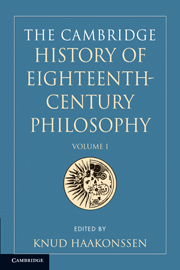Book contents
- Frontmatter
- CONTENTS
- Preface
- Methods of reference and abbreviations
- List of contributors
- I The Concept of Eighteenth-Century Philosophy
- II The Science of Human Nature
- 7 Philosophical Methods
- 8 Human Nature
- 9 Perception and Ideas, Judgement
- 10 Self-Consciousness and Personal Identity
- 11 Reason
- 12 Substances and Modes, Space and Time
- 13 Causality
- 14 Knowledge and Belief
- 15 Scepticism
- 16 Philosophy of Language
- 17 Rhetoric
- 18 Aesthetics
- 19 The Active Powers
- 20 Education
- Biobibliographical Appendix
- Bibliography
- References
20 - Education
from II - The Science of Human Nature
Published online by Cambridge University Press: 28 March 2008
- Frontmatter
- CONTENTS
- Preface
- Methods of reference and abbreviations
- List of contributors
- I The Concept of Eighteenth-Century Philosophy
- II The Science of Human Nature
- 7 Philosophical Methods
- 8 Human Nature
- 9 Perception and Ideas, Judgement
- 10 Self-Consciousness and Personal Identity
- 11 Reason
- 12 Substances and Modes, Space and Time
- 13 Causality
- 14 Knowledge and Belief
- 15 Scepticism
- 16 Philosophy of Language
- 17 Rhetoric
- 18 Aesthetics
- 19 The Active Powers
- 20 Education
- Biobibliographical Appendix
- Bibliography
- References
Summary
Education was a topic that held a central place in the concerns of eighteenth-century philosophy. The connection between philosophy and education goes back, of course, to Plato. However, for the eighteenth century, education had a particularly significant role to play. The term ‘Enlightenment’ applied to much of the period hints clearly at this – implying a process of ‘enlightening’, of education or re-education. Kant’s celebrated definition of enlightenment as man’s exodus from tutelage employs vocabulary that is redolent of that of education. The great Encyclopédie of Diderot and d’Alembert was an educational enterprise.
All societies engage in a process of conscious social reproduction, and education is part of that process. This in part explains the frequency with which philosophers, and particularly political thinkers, have written treatises on education. These writings seek to transmit to the new generation, via teachers, what is considered by present and previous generations to be of most value in their political, social, and moral arrangements. In this respect, educational treatises offer an indirect insight into the preoccupations of a particular epoch. In the case of those treatises written by major philosophers, the educational prescriptions contained within curriculum proposals are reinforced by epistemological foundations.
Educational philosophy is not, however, entirely concerned with the transmission of tradition. Educationists can also be innovators as well as assimilators. They may be seeking a reorientation of ideas and behaviour which will be achieved and secured through the mediation of the generations to come. If the existing political and social establishment is incapable of extensive reformation, it may be possible to achieve change by shaping the mentality of its successors.
- Type
- Chapter
- Information
- The Cambridge History of Eighteenth-Century Philosophy , pp. 608 - 638Publisher: Cambridge University PressPrint publication year: 2006
References
- 3
- Cited by



